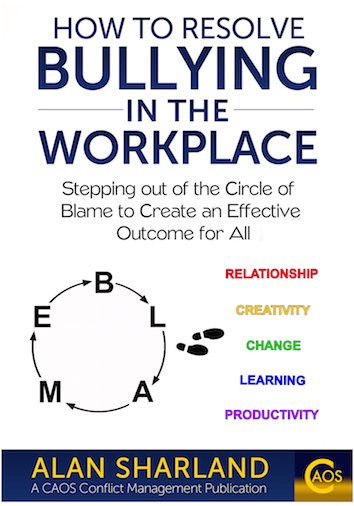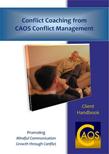|
What are the Differences between Conflict Coaching and Counselling?This page explores the question "What are the differences between Conflict Coaching and Counselling?" as it is one of the most common questions asked by people who are new to the idea of Conflict Coaching. There are of course many different descriptions of counselling and this link to the UK Charity MIND website will form the main basis for making comparisons in this article. The first description on that page summarises counselling thus: Counselling is a form of psychological or talking therapy that offers people a chance to change how they feel and to live better. So as a starting point for comparison with Conflict Coaching, it could be that an outcome of Conflict Coaching is that people may feel differently and see themselves as 'living better' as a result of having it but that would not be its main aim. The purpose of conflict coaching is to be a tool for any individual to use to reflect on and explore a difficult situation or unresolved conflict from the perspective of how they are communicating in that situation and whether their communication is helping towards the resolution of the conflict or is, perhaps, exacerbating it. Conflict Coaching is also used to explore and reflect on how they are responding to the conflict. Whether this is in a way that cannot lead to resolution because the energy invested goes into activities which are not towards that aim, intentionally or not, or whether they can use it, or start to use it, as an opportunity to resolve it through gaining or creating learning, connection and/or insight. So what does that actually mean in terms of how a Conflict Coach would support someone in ways that might differ from a Counsellor? One of the main differences between Conflict Coaching and Counselling is that the latter usually deals with a problem or difficulty that an individual is facing such as depression, addiction, eating disorder etc. As the webpage on the MIND website says in its discussion of the differences with psychotherapy: "Counselling is often seen as most appropriate for people who have a particular difficulty they want to deal with, or who are reacting to a distressing or stressful event, such as a bereavement or divorce. Someone who has longer-term difficulties, which can’t be linked to any particular event, may perhaps be better suited to longer-term or deeper work, such as psychotherapy. Counselling is regarded as more ‘supportive’ and psychotherapy as deeper-reaching. But the overlap between them means that people with long-term problems may work very successfully with a well-trained counsellor, once a week, over a longer period. This immediately highlights another of the differences between Conflict Coaching and Counselling in that Conflict Coaching has a limited number of sessions, usually just 3 and this is due to the emphasis in Conflict Coaching on enabling the client to become their own Conflict Coach. But to return to the quote above, the emphasis is on a difficulty an individual is facing such as the challenges referred to. In Conflict Coaching, the discussion relates to a communication difficulty or breakdown and /or an unresolved conflict with another person or group of people. The focus is on the 'behaviour not the person' and indeed this is in line with one of its guiding Principles that we 'Challenge/explore the behaviour not the person' in a situation. In Conflict Coaching there is never an 'assessment, diagnosis and prescription' of a client and so the client is not allocated a particular 'conflict type' or 'conflict style' as a form of diagnosis of their approach to conflict as this is recognised as variable and contextual. For example, a Conflict Coaching client would not be assigned a personality type as 'extrovert' or 'introvert'. They would not be set 'targets' or goals for change in the prescriptive sense that may sometimes occur in both counselling and other forms of coaching. The focus is continually on self-reflection in the face of the particular difficulty they are experiencing to help them review their approach to communication and their responses to the conflict. Principles of Effective Communication are used as references for clients to consider whether they are communicating effectively. They are helped to decide which Principles are relevant to their communication, and again they are not 'diagnosed' by the Coach, they are instead, helped to make their own diagnosis of their actions and the Coach is not invested in 'steering' them to any particular choice in this. Consideration by a client of their approach to their conflict is another part of Conflict Coaching support - are they 'competing' or 'avoiding' the conflict? Having gained an awareness of whether they are responding in either or both of these ways, Conflict Coaching can help clients to consider if they can also respond to their conflict as an opportunity - for learning, connection and / or insight through which, in this model of Conflict Coaching, all conflict is seen to be resolved.
|
"Alan Sharland has written a vital book on bullying. His approach is the way forward. Instead of focusing on 'proving it', which takes us in the direction of investigations and hearings that go no where and only serve to exacerbate an already sensitive situation, he shows the way forward through direct communication and a focus on the behavior that is of concern."
John Ford - HR Mediation Academy
The CAOS Conflict Coaching Clients Handbook
Here's a Handbook to help you practise more effective communication and to review and improve how you are responding to unresolved conflict:
Buy Now for just £4! or click on the image to find out more.
Conflict Coaching from CAOS Conflict Management No Problem!
We can provide it via Zoom!
Please let us know you'd like your Conflict Coaching via Zoom when you complete a Conflict Coaching Request form.
Are you:
An employer wanting access to Conflict Coaching for your employees?
A service provider wanting access to Conflict Coaching for your clients?
A health professional wanting access to Conflict Coaching for your patients?
Please CONTACT CAOS if you have an enquiry about Conflict Coaching or our other services.
Train to be a Conflict Coach with CAOS Conflict Management. Courses for individuals and for organisations. Click the link above to find out more.
"Hello [Coach], Thank you so much for coming the other day. I immediately put some of the things into action. I feel so much happier since then, as if a weight has been lifted. The situation has improved no end. I do feel empowered. I hope other people can benefit as I have done .... Thanks again." - Conflict Coaching client
Conflict Coaching for Executives and Senior Managers
Conflict Coaching for Workplace Disputes
Conflict Coaching for Family Disputes
Conflict Coaching for Bullying
Conflict Coaching at Christmas "I'm writing to say THANK YOU VERY MUCH! for the Conflict Coaching sessions. I found them very helpful. It's helped me to realise though I continue to have difficulties that I can approach and look at them differently. And feel more empowered to face difficult situations."- Conflict Coaching client
Tel: 020 3371 7507
Would you like Conflict Coaching but you don't live in London?







